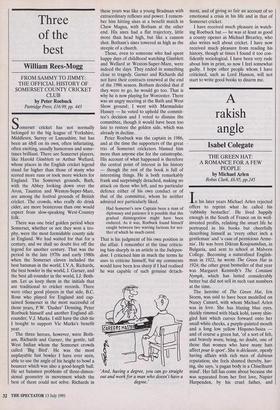Three of the best
William Rees-Mogg
FROM SAMMY TO JIMMY: THE OFFICIAL HISTORY OF SOMERSET COUNTY CRICKET CLUB by Peter Roebuck Partridge Press, £16.99, pp. 443 Somerset cricket has not normally belonged to the big league of Yorkshire, Middlesex, Surrey or Lancashire, but has been an idyll on its own, often infuriating, often exciting, usually humorous and some- times brilliant. There are Somerset players, like Harold Gimblett or Arthur Wellard, whose places in the English cricket legend stand far higher than those of many who scored more runs or took more wickets for England. The Somerset grounds, Bath, with the Abbey looking down over the Avon, Taunton and Weston-Super-Mare, are among the festival grounds of British cricket. The crowds, who really do drink cider, are more boisterous than one would expect from slow-speaking West-Country folk.
There was one brief golden period when Somerset, whether or not they won a tro- phy, were the most formidable county side in England. We had waited for that for a century, and we shall no doubt live off the legend for another century. That was the period in the late 1970s and early 1980s when the Somerset eleven included the best batsman in the world, I.V.A. Richards, the best bowler in the world, J. Garner, and the best all-rounder in the world, I.J. Both- am. Let us keep them in the initials that are traditional to cricket records. There were other good players in that side, B.C. Rose who played for England and cap- tained Somerset in the most successful of those years, P.W. 'Dasher' Denning, Peter Roebuck himself and another England all- rounder, V.J. Marks. I still have the club tie I bought to support Vic Marks's benefit year.
The three heroes, however, were Both- am, Richards and Garner, the gentle, tall West Indian whom the Somerset crowds called 'Big Bird'. He was the most unplayable fast bowler I have ever seen, able to use the angle of his height to bowl a bouncer which was also a good-length ball. He set batsmen problems of three-dimen- sional geometry in movement which the best of them could not solve. Richards in these years was like a young Bradman with extraordinary reflexes and power. I remem- ber him hitting sixes at a benefit match in Chew Magna, with Botham at the other end. His sixes had a flat trajectory, little more than head high, but like a cannon shot. Botham's sixes towered as high as the steeple of a church.
Those, even to someone who had spent happy days of childhood watching Gimblett and Wellard at Weston-Super-Mare, were indeed the days. They ended in something close to tragedy. Garner and Richards did not have their contracts renewed at the end of the 1986 season. Botham decided that if they were to go, he would go too. That is why he is now playing for Worcester. There was an angry meeting at the Bath and West Show ground; I went with Marmaduke Hussey — he voted to uphold the commit- tee's decision and I voted to dismiss the committee, though it would have been too late to restore the golden side, which was already in decline.
Peter Roebuck was the captain in 1986, and at the time the supporters of the great trio of Somerset cricketers blamed him more than anyone else for the catastrophe. His account of what happened is therefore the central point of interest in his history — though the rest of the book is full of interesting things. He is both remarkably frank and surprisingly detached, making no attack on those who left, and no particular defence either of his own conduct or of that of the committee, whom he neither admired nor particularly liked.
Had Somerset's new Captain been a man of diplomacy and patience it is possible that this gradual disintegration might have been endured. As it was, Roebuck found himself caught between two warring factions for nei- ther of which he much cared.
That is his judgment of his own position in the affair. I remember at the time criticis- ing him sharply in an article in the Indepen- dent. I criticised him in much the terms he uses to criticise himself, but my comments would have been less sharp if I had realised he was capable of such genuine detach- `And, having a degree, you can go straight out and work for a man who doesn't have a degree.' ment, and of giving so fair an account of so emotional a crisis in his life and in that of Somerset cricket.
I have received much pleasure in watch- ing Roebuck bat — he was at least as good a county opener as Michael Brearley, who also writes well about cricket. I have now received much pleasure from reading his history, though at times I found it too con- fidently sociological. I have been very rude about him in print, so now I feel somewhat guilty. I hope other people whom I have criticised, such as Lord Hanson, will not start to write good books to disarm me.


















































 Previous page
Previous page